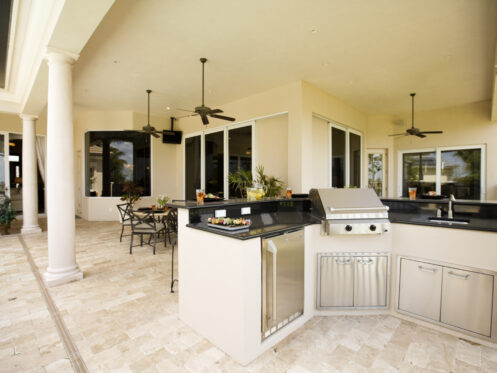You might be a homeowner who loves to barbeque outside whenever the weather permits. You may get tired of spending a small fortune on propane tanks to support your preferred cooking style. If so, connecting an outdoor grill to your home’s natural gas supply is a great option. Doing so lets you take advantage of cheaper natural gas rates. It also guarantees you’ll never run out of gas, no matter how much you barbeque. But is it safe to connect your outdoor grill to your home’s gas lines? Here’s everything you need to know about doing it.
Using the Right Grill
Before you connect an outdoor grill to your home’s gas line, there are some things to consider first. One is that propane and natural gas aren’t interchangeable. Without substantial modifications, you can’t connect a propane grill to a natural gas line. Propane requires different burners, regulators, and burner orifices. Plus, the connectors used for a propane grill aren’t compatible with natural gas supply lines.
Fortunately, some barbeque manufacturers make conversion kits to switch to a natural gas supply. Contact your grill’s manufacturer to determine if your barbeque is a conversion candidate. If so, its conversion kit will likely come with some combination of the following:
- New gas orifices
- New burners
- Natural gas supply hoses
- New valves
- Appropriate wrenches
If your grill’s manufacturer doesn’t make a conversion kit, do not try to use a universal kit from a third party. It may not be safe, and it will void your grill’s warranty. It’s a better idea to buy a new grill that’s compatible with natural gas.
Preparing Your Home’s Gas System
Unless your home already has an outdoor natural gas connection, you’ll need a gas plumber to add one. Depending on your home’s existing gas lines, the process may be simple or require substantial modifications. The following are the steps involved.
Checking Capacity
The first step in connecting a grill to your home’s gas supply is checking its natural gas supply capacity. Your supply line and gas meter may not support an additional outlet. A plumber would have to check your meter’s capacity to find out. Then, they’d need to add up the maximum BTU output of your existing gas appliances. That would let them know if your system could accommodate the BTU output of your grill added to the mix. If your home’s gas supply and meter need upgrades, they will perform them before connecting your grill.
Planning Grill Location
Ideally, you’ll want your grill located somewhere near an exterior wall of your home. That provides the shortest distance to reach your home’s gas supply. Running outdoor gas lines to reach a grill elsewhere in your backyard is possible. However, it will add significantly to the cost of your project. It may require coordination with your local utility companies before you can bury a new pipe. Plus, it could damage your landscaping.
New Gas Line Installation
With the planning completed, the next step is installing a new supply line to reach your grill location. The plumber will begin by turning off your home’s gas supply at the meter. Then, they’d cut into an existing gas line as close to your grill location as possible. There, they’d add a valve to allow connection to your new line. If the plumber runs the new line through your basement, they’ll likely suspend it from your floor joists. They would also drill through your home’s exterior wall to install a stub out to supply your grill. It is also necessary to add a shutoff valve on the supply line both inside your home and at the stub out. It’s a safety measure that makes cutting off your gas supply easy in an emergency.
Pressure Testing
After running your new gas line, the plumber will test it to check for leaks. They do this by attaching a pressure gauge to one end of the new run and an air compressor to the other. Next, they will pressurize the line to a capacity far above your home’s natural gas pressure. They’ll leave the line pressurized for at least 30 minutes. Meanwhile, they’ll spray soapy water on the new line’s connections. That will help locate leaks if present. Assuming no leaks occur, the line should hold its rated pressure for the test’s duration. Then, the plumber will connect the new line to the previously installed valve on your home’s existing gas line.
Installing a Quick Connect
Unless your outdoor grill is part of a permanent installation, you will also want a quick connect installed. It gets installed on the end of your new stub out, making connecting and disconnecting your grill safer. Quick connect valves automatically close when you pull their mated hose end out. Some even feature thermal protection that forces them closed when they detect heat.
Turning Your Home’s Gas Supply Back On
With the new line installed and your grill connected, the next step is turning your home’s gas supply back on at the meter. With that complete, the plumber will recheck all fittings for signs of leaks. If they don’t find any, they’ll open the valves on your new line and test your grill.
Additional Benefits of Natural Gas Grilling
Besides being cheaper and more reliable, there are other reasons to consider switching to a natural gas grill. One is that it’s more environmentally friendly. Natural gas requires less oxygen to support its combustion. That makes it cleaner burning than propane. Also, natural gas requires less refinement than propane, further decreasing its environmental effects. Your barbecue guests will notice the difference. After switching to a natural gas grill, you’ll enjoy cleaner outdoor air while you cook and relax.
Natural gas is also safer to use than propane. Since it operates at lower pressures, it’s less likely to leak. And even if it does, natural gas dissipates faster in the air. That reduces concentrations and diminishes the chance of an explosion. Your grill itself will also be safer. Remember, natural gas grills use the same technology in your home’s gas stovetop. It’s safe enough to use indoors and even safer outdoors.
Local Gas Piping Installers
If you’re ready to upgrade to a natural gas barbecue, you need a qualified plumber to help. The plumbers at Hope Plumbing have the training and experience to install gas lines safely. We also offer additional plumbing services, from leak repairs to rooter services, water heaters, and more! We even provide financing options on approved credit to help you pay for more extensive plumbing upgrades. For over 17 years, we’ve been the plumbers that Indianapolis residents trust the most. To prove it, read some of our customer reviews. Or, consider that we’re Better Business Bureau accredited with an A+ rating. If you’re interested in connecting your grill to the gas supply in your Indianapolis home, call Hope Plumbing today!

